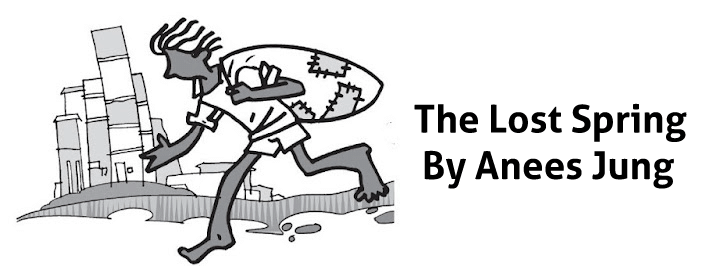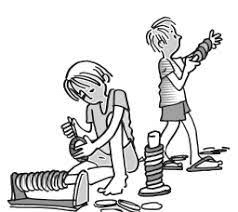Lost Spring Class 12 English Flamingo
| Table of contents |

|
| Key Points of the Story |

|
| Detailed Summary |

|
| Conclusion |

|
| Theme |

|
| Difficult Words |

|
Key Points of the Story
- The Lost Spring summary describes the terrible condition of poor children.
- These children are those who didn’t get to enjoy childhood because of the prevailing socio-economic conditions in this world.
- This is something that one can see all over the world.
- These children don’t have the opportunity for schooling.
- Moreover, there is a lot of pressure on these children to enter into labor early in life.
- These unfortunate children are forced into labor.
- This certainly denies them education as well as the opportunity to have enjoyment.
- The author Anees Jung raises voice to eliminate child labor.
- Jung does so by raising awareness regarding child education and strict law enforcement against child labor.
- The call is to put an end to the exploitation of children.
- This way, the children will be able to enjoy the days of the spring and have fun.

Detailed Summary
The first part tells the author’s impressions regarding the life of poor rag pickers. The rag pickers have come from Dhaka. Furthermore, the rag pickers are settled in the area of Seemapuri. Destruction has come in their fields and homes due to the storms. They had come to the big city in the hope of finding living there. However, the reality was, in fact, painful for them, and they had to face many hardships. They are certainly poor and lack various resources.
The writer watches Saheb every morning as he scrounges for “gold” in the neighborhood. The means of survival for these rag pickers is the garbage. Furthermore, for the children, it is a wondrous thing. The children are able to find a coin or two from it. These people have ambitions and desires. The problem is that they do not know how to make them possible. There are quite a few things that they are unable to reach.
Later, Saheb joins a tea stall where there is a possibility for him to earn 800 Rupees and all the meals. However, this job has deprived him of his freedom. As such, their condition is pretty hopeless and full of misery.
The second part explores Mukesh's life. Mukesh is a boy who belongs to the Bangle-makers' family. Firozabad is famous for its amazing glass-blowing industry. There is an engagement of nearly 20,000 children in this particular business. Furthermore, no one over there understands or respects the law that forbids child labor. Moreover, the living conditions, as well as the working environment, are both horrendous.
These children live in dreary cells. Also, they work close to hot furnaces. This is certainly very dangerous as it makes these children blind when they enter adulthood. Furthermore, these children have to deal with the pressure of debt. Moreover, they are unable to think of a solution to solve this problem. There is no way for these children to come out of this trap.
The policemen, bureaucrats, middlemen, and politicians will all hinder their way of progress. The women in the household consider it to be their destiny or fate. As a result of such thinking, they just follow the established tradition. There is something different about Mukesh. He is not like the rest of the folk there. This is because Mukesh has big dreams. He has a desire to become a motor mechanic in the future. The garage is far away from where he lives, but he has the determination to walk.
Conclusion
Lost Spring summary gives us an analysis of the impoverished condition faced by many children that condemn them to a life of pain, oppression, and lack of education.

 |
Download the notes
Summary: Lost Spring
|
Download as PDF |
Theme
The lesson talks about poor kids who have tough lives, work early and miss out on a happy childhood. Anees Jung, the writer, wants to stop child labor and make sure all kids can go to school. She tells stories about Saheb-e-Alam, a slum kid who dreams of playing tennis and going to school, and Mukesh, a boy from a bangle-making family who wants to become a car mechanic. The lesson is about helping these kids have better lives.
Difficult Words
Word = Meaning
- Scrounging = searching, rummaging
- Encounter = meet, come across
- Neighbourhood = locality, area
- Memory = recollection, remembrance
- Storms = tempest, weather
- Mutter = murmur, whisper
- Glibly = easily, fluently
- Hollow = empty, void
- Advice = suggestion, guidance
- Embarrassed = ashamed, self-conscious
- Bleak = desolate, grim
- Announces = declares, states
- Universe = cosmos, world
- Roams = wanders, meanders
- Barefoot = without shoes, unshod
- Recognise = identify, know
- Shelf = rack, ledge
- Tradition = custom, practice
- Excuse = justification, reason
- Perpetual = continuous, everlasting
- Desolation = emptiness, bleakness
- Backyard = rear area, back space
- Panting = gasping, puffing
- Goddess = deity, divine
- Acquaintance = knowledge, familiarity
- Periphery = edge, boundary
- Metaphorically = symbolically, figuratively
- Squatters = settlers, occupiers
- Wilderness = wasteland, barren
- Tarpaulin = waterproof sheet, covering
- Sewage = waste, effluent
- Drainage = outflow, runoff
- Identity = recognition, persona
- Survival = existence, life
- Tattered = torn, ragged
- Transit = movement, shift
- Proportions = scale, size
- Scrounging = searching, seeking
- Elders = seniors, aged
- Fenced = enclosed, barricaded
- Inside = within, interior
- Gatekeeper = guard, watchman
- Swing = playground seat, pendulum seat
- Discoloured = faded, stained
- Discarded = thrown away, cast off
- Barefoot = without shoes, unshod
- Intently = closely, keenly
- Booth = stall, kiosk
- Canister = container, tin
- Carefree = untroubled, relaxed
- Master = owner, leader
- Mechanic = technician, repairman
- Mirage = illusion, optical illusion
- Bangles = bracelets, ornaments
- Engaged = involved, occupied
- Famous = well-known, renowned
- Industry = business, sector
- Looms = appears, emerges
- Generations = eras, age groups
- Furnaces = ovens, heaters
- Welding = joining, fusing
- Dingy = dark, gloomy
- Slog = work hard, toil
- Beam = shine, glow
- Stinking = smelly, foul-smelling
- Hovels = shacks, small houses
- Crumbling = breaking down, deteriorating
- Primeval = ancient, primitive
- Thatched = covered, roofed
- Sizzling = frying, crackling
- Frail = weak, delicate
- Veil = cover, mask
- Impoverished = poor, destitute
- Renovate = restore, refurbish
- Destiny = fate, future
- Lineage = ancestry, descent
- Spirals = coils, twists
- Unkempt = Messy, Disheveled
- Handcarts = Trolleys, Pushcarts
- Shanty = Hut, Shack
- Hutments = Huts, Dwellings
- Flickering = Glinting, Flashing
- Welding = Joining, Bonding
- Eyesight = Vision, Sight
- Sanctity = Purity, Holiness
- Suhaag = Marital, Wedded
- Auspiciousness = Luck, Blessing
- Veil = Scarf, Cover
- Lament = Mourn, Grieve
- Initiative = Drive, Effort
- Cooperative = Joint, Shared
- Vicious circle = Loop, Cycle
- Middlemen = Brokers, Agents
- Forefathers = Ancestors, Elders
- Hauled up = Dragged, Pulled
- Illegal = Unlawful, Forbidden
- Spiral = Coil, Helix
- Poverty = Destitution, Neediness
- Apathy = Indifference, Disinterest
- Greed = Avarice, Covetousness
- Injustice = Unfairness, Wrongdoing
- Stigma = Disgrace, Shame
- Sahukars = Moneylenders, Creditors
- Middlemen = Intermediaries, Brokers
- Bureaucrats = Officials, Administrators
- Baggage = Burden, Load
- Dare = Challenge, Brave
- Mechanic = Repairman, Technician
- Garage = Workshop, Carport
- Embarrassment = Discomfort, Shame
- Regret = Remorse, Sorrow
- Murmur = Whisper, Mumble
- Hurtling = Speeding, Racing
|
18 videos|275 docs|85 tests
|
FAQs on Lost Spring Class 12 English Flamingo
| 1. What is the key point of the story "Lost Spring"? |  |
| 2. Can you provide a detailed summary of the story "Lost Spring"? |  |
| 3. What is the conclusion of the story "Lost Spring"? |  |
| 4. What is the theme of the story "Lost Spring"? |  |
| 5. Are there any difficult words in the story "Lost Spring"? |  |






















